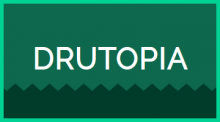Drutopia is a flexible and extensible Drupal distribution that can be used as the basis for building a single website for your group or a customized platform for your network or organization.
The power of a globally-developed robust content management framework with faceted search, structured interrelated content, and growing democratic communication features is made accessible to grassroots groups by Drutopia.
As a base distribution, Drutopia is pre-configured to provide the content types and other features that organizations will need when developing a public-facing website. It also comes with a number of already designed “Skins” which provide the front-facing look of a site.
By building on Drupal, a powerful content management system (CMS), Drutopia allows those with little technical skill to easily add the content and images that drive your website. Detailed documentation provides tips on how to work with your site.
Drutopia can also be used as a base distribution off of which we can build specialized distributions that meet more targeted needs of a sector or network.
Lead project partners Agaric and Chocolate Lily are available for hire to customize sites and build custom distributions. Agaric also offers a hosted version of Drutopia.
Background and history
For the Drupal 7 cycle Drutopia Leadership Team members Nedjo Rogers and Rosemary Mann of Chocolate Lily developed and maintained the Open Outreach distribution for nonprofits. Another Leadership Team member, Clayton Dewey, was active in the Open Aid distribution. Joining forces with Ben Melançon from Agaric and others who joined for periods of time, this group met, planned and built the Drutopia distribution for Drupal 8 on a volunteer basis over the past four years.
Part of the discussion and work focused on the technical challenges of building a distribution for Drupal 8 which was must less suited for this task than previous versions of the software. To enable this work Nedjo Rogers took a lead on developing a new interface for Features as well as number of modules for configuration management.
On top the the development work required to build, package and maintain a distribution, the leadership team also developed strategies for developing an alternative economic model. The vision was three-fold. Firstly, the idea of a hosted version (often called software as a service) was linked with the concept of platform cooperatives so that effectively those using the software would be its owners. Secondly, the goal was to work with groups to effectively pool resources so that rather than paying for custom development, groups would collectively pay for new enhancements of shared tools. And thirdly, we envisioned a point where rather than contributing as volunteers, Drutopia partners could receive some remuneration for their work.
Work continued on developing the distribution, adding new functionality and enhancing the theme layer which provides the front-end look and feel of a site. At the same time, groups started using Drutopia, joining the nascent group of those with hosted sites, although not yet formed as a cooperative. Agaric and Chocolate Lily provided customizations for clients in this process and those customizations often were added back into the distribution. Some of those sites are featured on our Projects page.
The base Drutopia distribution was always envisioned as a starting point. In early 2020 as a leadership team, we made the decision that we’d roll out a first full release capturing all the work done to date. From here, while happy to develop individual sites as group’s needed, we’d also start to focus on the next task of building more focused distributions that would be built off of Drutopia but narrow in a more specific use case targeting a sector. These more focused distributions (and then the sites built off of them) would be done by one of the partner Drupal shops (Chocolate Lily and Agaric) as client projects rather than as general Drutopia work.
It was also decided that the planned platform cooperative would also morph and perhaps be based on those more specific distributions or more geographically-based. One of the challenges we had faced was different countries with fairly different cooperative legislation. So that is still a work in progress, but one that still holds an important place in our beliefs.
Core values
While much as changed as we have developed the project over the past years, our core values have not. We know that these will be the values of many of the groups and organizations that are our ideal collaborators and clients and it is in this meeting of values that we can all thrive.
Core values of the Drutopia initiative include:
• Be inclusive regarding gender, gender identity, sexual orientation, ethnicity, ability, age, religion, geography and class.
• Commit to protection of personal information and privacy and freedom from surveillance.
• Value collaboration and cooperation above competition.
• Prioritize human needs over private profit.
• Foster non-hierarchical structures and collective decision-making.
